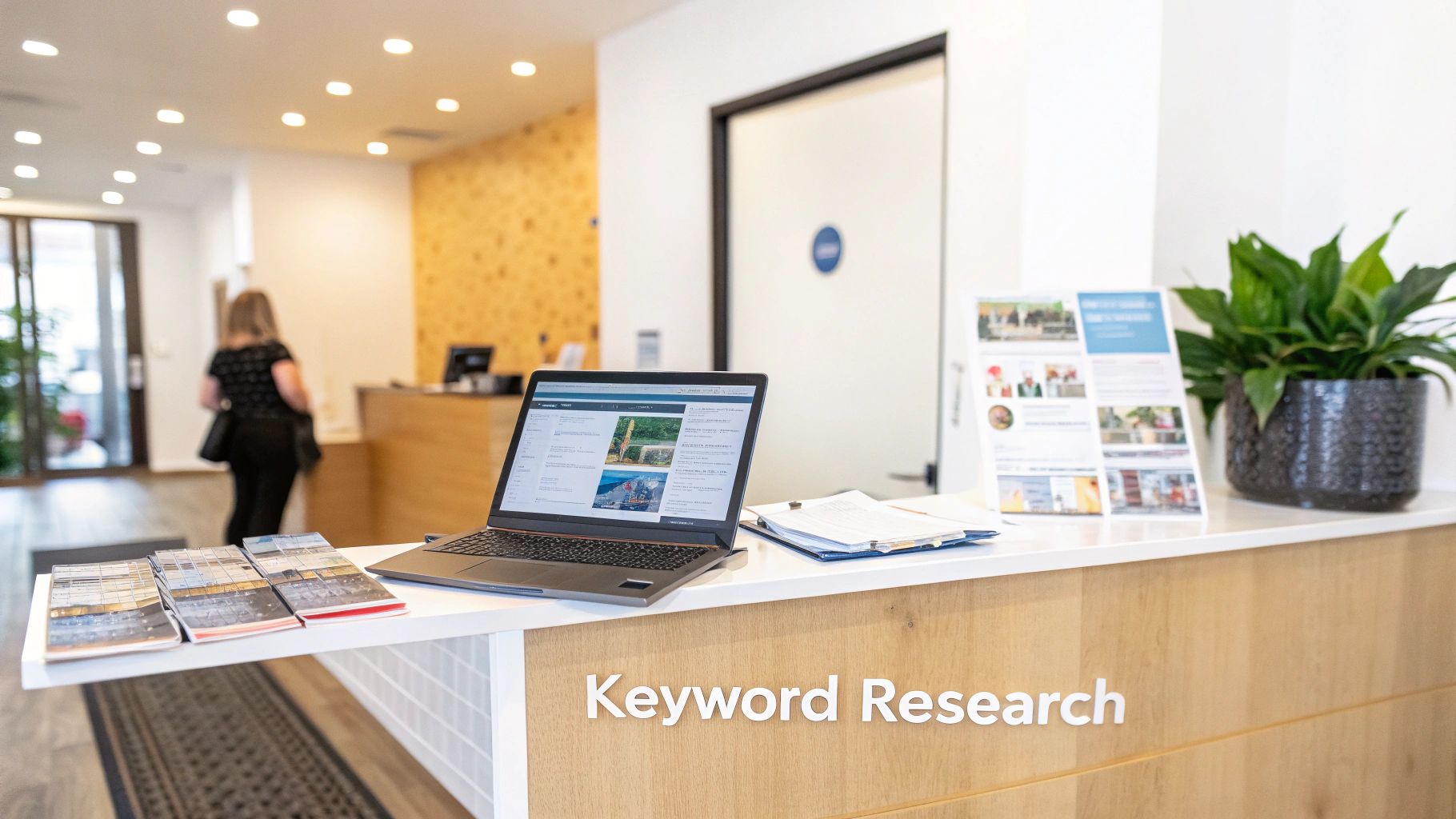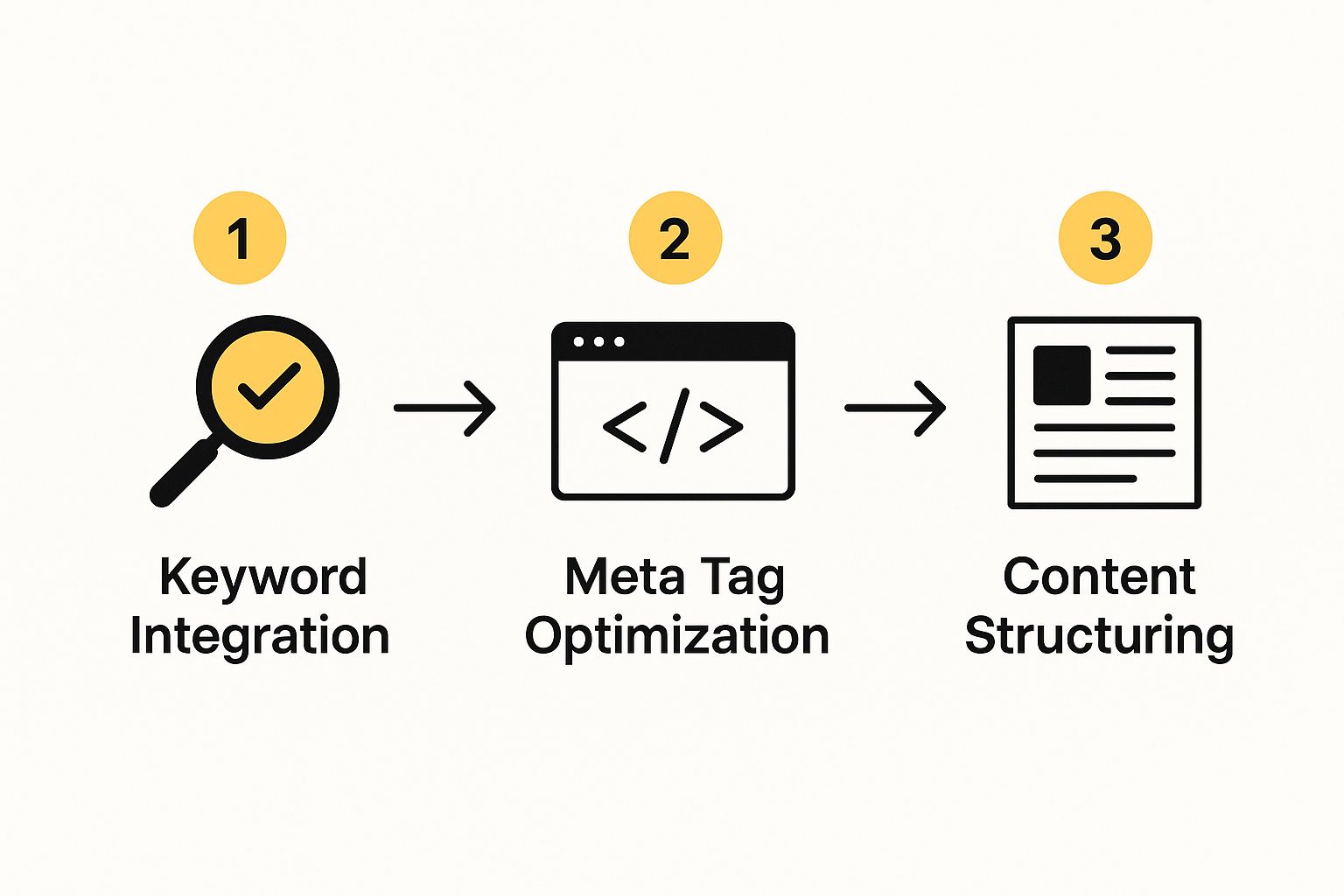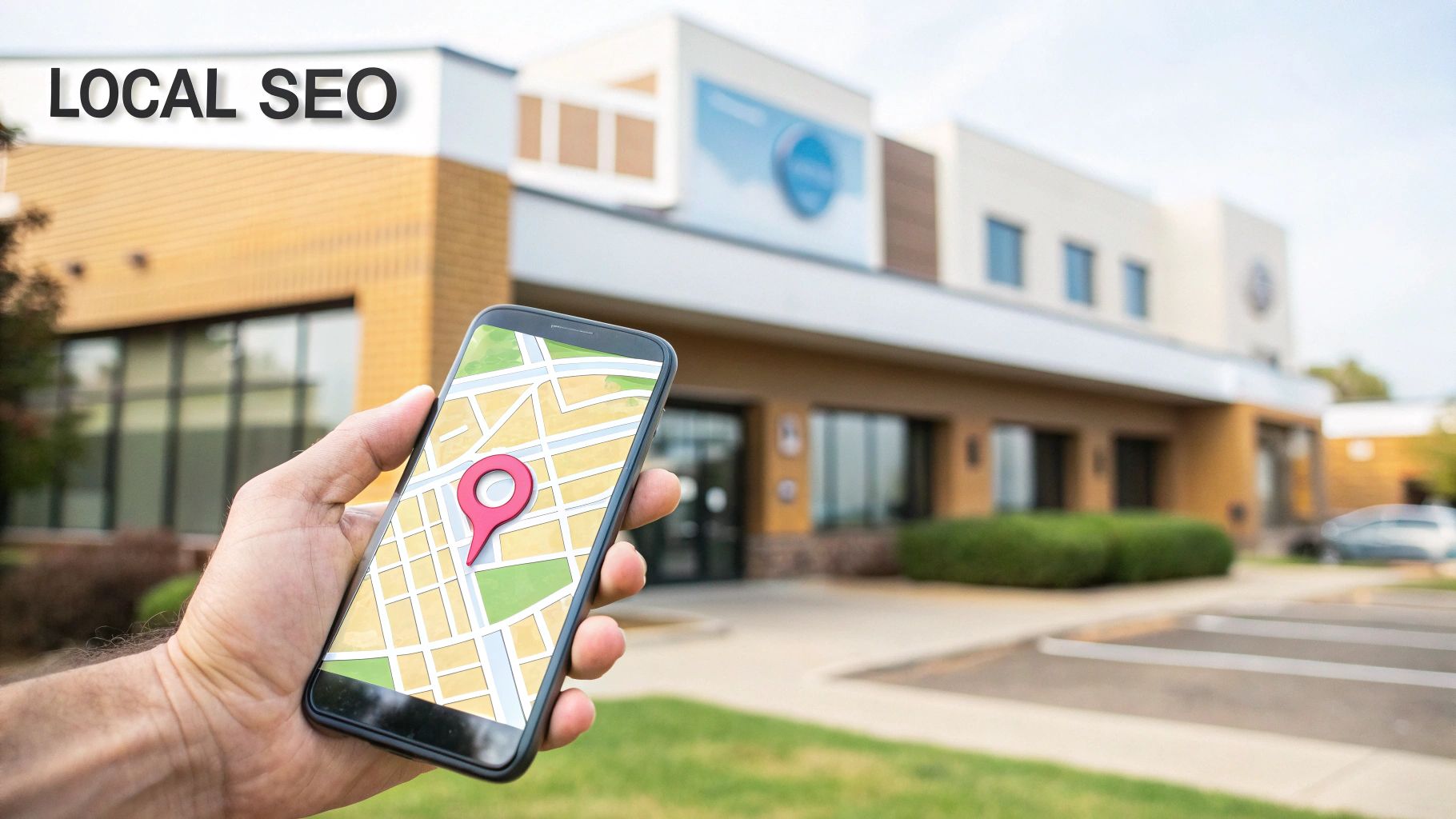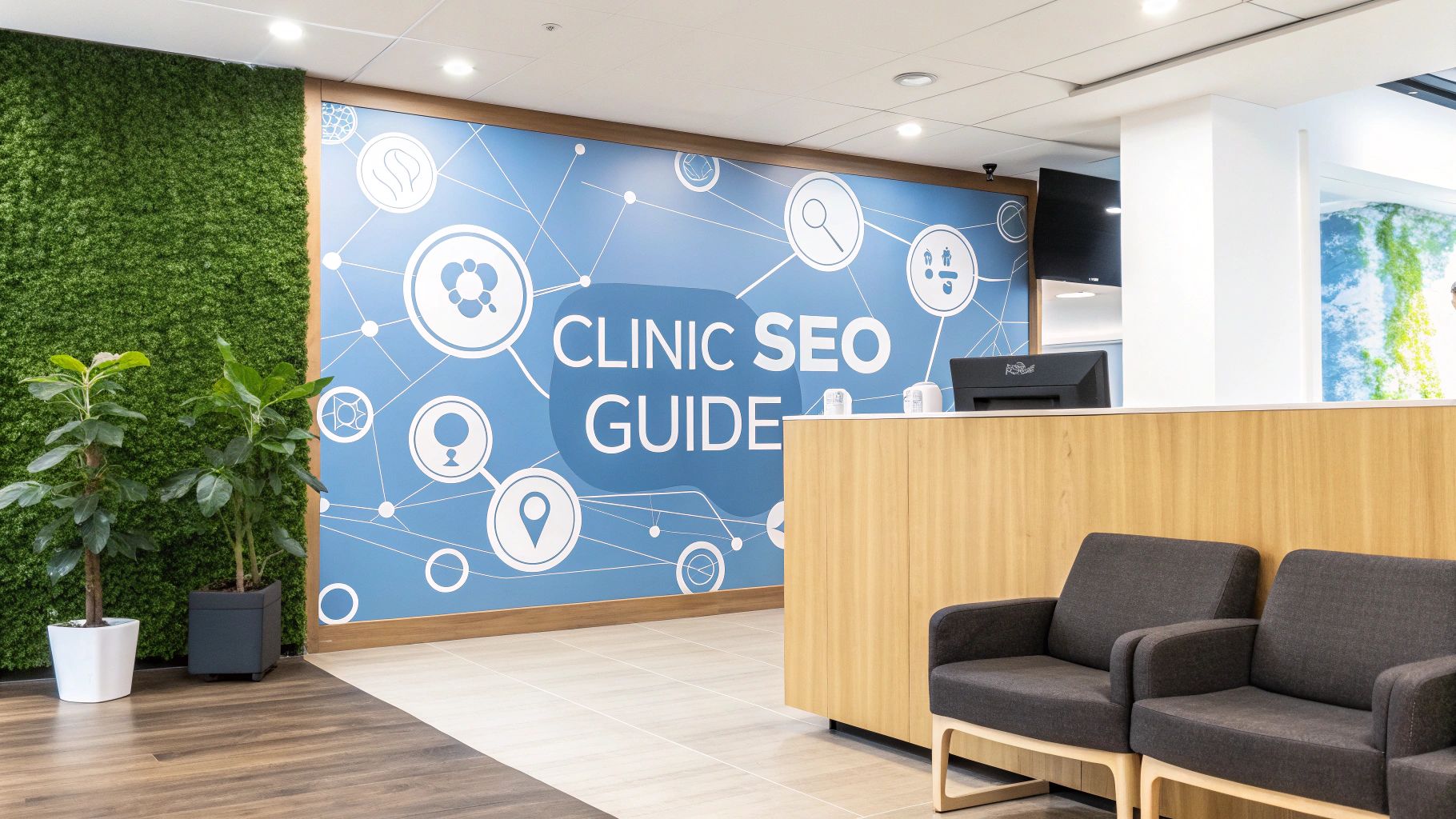Effective SEO for a rehab clinic isn’t just another marketing box to check—it’s the most important bridge you can build to connect your center with individuals and families at their most vulnerable.
When someone finally musters the courage to search for help, your clinic has to be there. In a field crowded with competition, a smart SEO strategy is the only reliable way to keep patient inquiries coming and fill your beds.
Why SEO Is Your Most Critical Patient Lifeline

When someone takes that brave step to look for addiction help online, they aren't just casually browsing. They are looking for a lifeline, a trusted answer in a moment of crisis.
In those critical moments, search engine optimization is what determines whether they find your facility or a competitor. With more and more rules clamping down on paid advertising for treatment centers, a strong organic search presence isn't just a good idea—it's essential for survival.
The real goal of SEO is to make your clinic the first and most credible option a person sees. It's about building a digital presence that truly reflects the quality of care you provide, creating a foundation of trust before anyone even picks up the phone. If this is all new territory, a solid beginners guide to digital marketing can help you get your bearings and see where SEO fits in.
To get a clearer picture of what this involves, let's break down the core components of a solid SEO plan for any rehab center.
Core Pillars of Rehab Clinic SEO
| SEO Pillar | Primary Goal |
|---|---|
| On-Page SEO | Clearly tell Google and visitors what you do and who you help. |
| Local SEO | Show up for high-intent searches like "rehab near me." |
| Content & E-E-A-T | Build trust by proving your expertise and answering real questions. |
| Technical SEO | Ensure your website is fast, secure, and easy for Google to understand. |
These pillars work together to build a presence that isn't just visible, but also seen as a reliable and authoritative resource for people in need.
Moving Beyond Ads to Sustainable Growth
Paid ads can get you traffic fast, but that fire goes out the second you stop feeding it money. A well-built SEO strategy is different. It creates lasting digital authority that can bring in qualified inquiries for years to come by focusing on genuine value for your audience.
Here’s how that breaks down:
- On-Page SEO: This is about fine-tuning your website's content and structure. It's how you communicate your specific services—like detox, inpatient care, or dual diagnosis—to both people and search engines.
- Local SEO: This is absolutely critical. You need to show up when someone searches for "inpatient drug rehab near me." These are the searches that convert.
- Content & E-E-A-T: Creating genuinely helpful, expert-written content is how you answer your audience's questions and establish your clinic as an authority you can trust.
- Technical SEO: This covers the nuts and bolts—making sure your site is fast, secure, and easy for Google to crawl and index.
When you bring all these elements together, you're not just getting seen. You're being perceived as a credible, reliable source of help.
The Real-World Impact of a Focused SEO Strategy
The line between search visibility and patient admissions is direct and clear. We've seen it happen time and again.
One of our clients, a small Midwest facility, implemented a focused SEO strategy and grew its website traffic by 40% in just six months. But here’s the number that really matters: that traffic growth led to a 25% increase in patient inquiries. That’s a real, measurable return on investment.
By investing in a data-driven SEO strategy, you’re not just chasing keywords; you're building a sustainable pipeline of individuals who are actively looking for the help you provide. It’s the most powerful way to ensure your doors stay open to serve your community.
By taking a thoughtful, strategic approach to your online presence, you can see incredible growth. To see how these techniques can be applied to your center, learn more about our dedicated SEO marketing services designed to boost visibility and drive admissions.
Winning the Local Search for Nearby Patients
When someone is looking for help, proximity is everything. A search for "alcohol rehab near me" isn't just a query—it's a cry for an immediate, accessible solution. This is why dominating local search results is non-negotiable for any rehabilitation clinic. Your visibility in these moments is what connects you with the people who need you most, right when they need you.
The game changed for the treatment industry when digital advertising policies tightened up, making organic, local visibility the primary way to reach new patients. It's not just a hunch; research shows that 76% of people seeking addiction treatment want a facility within a 25-mile radius. That statistic alone cements local SEO as the absolute cornerstone of your digital strategy.
Your Google Business Profile Is Your Digital Front Door
Think of your Google Business Profile (GBP) as the first handshake a potential patient has with your clinic. It’s so much more than a listing—it’s a dynamic profile that builds trust and drives calls, but only if you optimize it correctly. So many clinics set it and forget it, which is a massive missed opportunity.

This dashboard is your command center for everything local. It's where you manage your service areas, respond to patient reviews, and directly influence how you show up in the local map pack and search results.
To really make an impact, you have to go beyond the basics. A fully optimized profile should include:
- Precise Service Categories: Don't just settle for "Rehabilitation Center." Get specific. Your primary category could be "Drug Addiction Treatment Center," with secondary ones like "Alcoholism Treatment Program."
- In-Depth Service Listings: Detail every single program you offer. Think "Inpatient Detox," "Outpatient Counseling," and "Dual Diagnosis Treatment." Leave no stone unturned.
- Compelling Photos and Videos: Show off your facility, your caring staff, and the serene environment you’ve created. A virtual tour can do wonders to demystify the experience for someone who is anxious about taking that first step.
- Active Q&A Section: Get ahead of the curve by answering common questions about insurance, the admissions process, and what patients should expect. It shows transparency and positions you as an expert.
Building Powerful Location-Specific Pages
While your GBP is critical, it needs strong on-site signals to back it up. That's where location-specific service pages come in. These are pages laser-focused on ranking for those hyper-local searches, like "outpatient drug rehab in Austin" or "holistic treatment center Dallas."
A common mistake I see is clinics creating one generic "Services" page and calling it a day. Instead, you need to build dedicated pages for each core service in every primary location you serve. This sends a powerful signal to Google that you are highly relevant for those specific, high-intent searches.
This approach ensures you're showing up exactly when and where it matters most, connecting you directly with individuals and families in your community who are actively searching for help.
Building Unshakeable Trust with E-E-A-T

When it comes to addiction treatment, trust is everything. It's the currency that matters most to the people seeking help and, as it turns out, to Google as well.
That’s where Google’s E-E-A-T framework comes in. It stands for Experience, Expertise, Authoritativeness, and Trustworthiness, and for a rehab clinic, it’s not just an SEO acronym—it’s your roadmap to proving your credibility online. This is how you show both search engines and vulnerable individuals that you are a legitimate, reliable resource.
Showcasing Real-World Experience
The first "E" for Experience is a game-changer for rehab clinics. It’s Google asking a straightforward question: does the person behind this content actually know what they're talking about from first-hand involvement?
For your clinic, this means getting granular. Generic service descriptions just won't cut it anymore.
- Detailed Program Pages: Don't just list "inpatient detox." Create a rich page that walks someone through a typical day. Talk about the therapeutic models you use and what a patient can expect to achieve, all from their perspective.
- Staff Bio Pages: Your team is your biggest asset. Go beyond a list of credentials. Build out full bio pages for your clinical staff, highlighting their years of direct, hands-on experience helping people navigate addiction.
Proving Expertise and Authority
Expertise and Authoritativeness are about cementing your position as a leader in addiction treatment. This is where you demonstrate your deep knowledge and show that others in your field respect your work.
One of the most effective ways I've seen clinics do this is by publishing genuinely helpful, well-researched content that answers the tough questions families are asking.
I often advise clinics to think of their blog not as a marketing tool, but as a public service. When you create content that genuinely helps someone understand their situation better—like explaining the signs of prescription drug abuse or how to talk to a loved one—you build immense trust. This signals to Google that you are a legitimate authority.
Building Unbreakable Trustworthiness
Trust is the final, crucial piece that ties everything together. Every action you take should build a foundation of trustworthiness. This includes the technical basics, like a secure HTTPS website, a clear privacy policy, and easy-to-find contact information.
But you can also build trust through social proof.
- Patient Testimonials: With full consent, share recovery stories. These narratives are incredibly powerful, offering hope and building confidence in your programs.
- Accreditations and Licenses: Make sure your accreditations, like those from The Joint Commission or CARF, are displayed prominently on your site. These are non-negotiable, third-party validations of your commitment to quality care.
- Trust Badges: To visually signal credibility and security to your website visitors, consider implementing trust badges, which can be created using trust badge generators.
By weaving each element of E-E-A-T into the very fabric of your website, you’re not just chasing rankings. You're building a digital presence that earns the confidence of the people who need you the most.
Finding the Keywords That Drive Admissions
Good SEO for a rehab clinic isn’t just about ranking for "rehab near me" and calling it a day. That’s table stakes. Real results come from getting inside the head of your audience—understanding their emotional state and the exact words they use when they’re desperate for help.
You have to meet them right where they are, and that starts with understanding search intent. This is the "why" behind what someone types into Google. A person in the middle of a crisis speaks a different language than someone just starting to suspect there’s a problem. Your job is to show up for both.
Matching Keywords to the Patient Journey
Think of keyword research as a form of digital empathy. You're mapping out the language of need at every stage of the recovery journey. I’ve found it helpful to break these down into three main buckets, each needing its own content approach.
-
Informational Keywords: This is where it all begins. Families and individuals in the awareness stage are looking for answers, not a sales pitch. They’re searching for things like "signs of prescription drug abuse" or "what does detox feel like?" The goal here is to create genuinely helpful blog posts and guides that build trust right from the start.
-
Navigational Keywords: This is when someone is actively looking for you. Searches like "[Your Clinic Name] reviews" or "[Your Clinic Name] address" mean they already know who you are. Making sure your information is accurate and positive for these searches is a must.
-
Transactional Keywords: These are the money terms—the high-intent searches that lead directly to admissions. When you see a search for "inpatient treatment for alcoholism" or "dual diagnosis centers near me," that person is ready to make a call. These long-tail keywords need to be the absolute focus of your core service and location pages.
I’ve seen clinics pour their entire budget into high-intent keywords, completely ignoring everyone else. That's a huge mistake. By answering those early-stage, informational questions, you build a relationship. You become the name they trust, and the first one they think of when they’re finally ready to take that next step.
How to Uncover High-Value Search Terms
So, where do you find these golden phrases? Fancy tools like SEMrush or Ahrefs are fantastic, but you can get surprisingly far with some common-sense methods.
- Get in Their Shoes: Seriously, just brainstorm. What would a terrified parent ask Google at 2 AM? What are the biggest fears and secret questions someone struggling with addiction might have? Write every single one down.
- Use Google's Autocomplete: This is a direct line to what people are actually searching for. Start typing a phrase like "how to help an alcoholic" into the search bar and watch what Google suggests. Those are real queries from real people.
- Mine the "People Also Ask" Box: This section in the search results is a content goldmine. It literally shows you the other questions people have on the same topic, giving you a ready-made outline for a comprehensive resource that anticipates their needs.
When you dig into keyword research this way, you stop just "doing SEO" and start building a strategic content map. Every page on your site gets a clear purpose, connecting with people at every single point in their journey toward getting well.
Earning High-Authority Backlinks for Your Clinic
Backlinks—links from other websites pointing to yours—are one of Google's biggest trust signals. You can think of each one as a vote of confidence. When a reputable site links to your clinic, it’s basically telling Google you're a credible, trustworthy voice in the addiction treatment world.
But this isn't about spammy tactics or buying links. Real link-building is about earning that trust through genuine relationships and creating actual value. It’s about showing your clinic is a pillar of the community, not just another business. Good SEO for rehab clinics depends on a portfolio of links that prove your authority.
Building Links Through Community Engagement
Your best link-building opportunities are probably right in your own backyard. Start by building real-world connections that can turn into valuable digital endorsements down the line.
A great place to start is with local news outlets. Journalists are always on the hunt for expert sources. When you offer your clinical staff for interviews on topics like mental health trends or the opioid crisis, you’re giving them valuable expertise and earning a high-authority backlink in return.
Partnering with non-profit organizations is another fantastic avenue.
- Sponsor a local charity 5K: Your clinic almost always gets a link from the event page.
- Host a free community workshop on stress management: The organizations you partner with will link to your registration page to get people signed up.
- Offer your space for local support groups: Groups like Alcoholics Anonymous or Narcotics Anonymous might link to your facility as a meeting spot.
These actions don't just generate powerful local links; they cement your clinic’s reputation as a provider that genuinely cares about the community.
The best, most sustainable backlinks come from real-world relationships. Don't ask, "How can I get a link?" Instead, ask, "How can I provide real value to this organization?" The link will naturally follow the value you create.
Creating Link-Worthy Resources
Sometimes, the simplest way to get links is to create something so genuinely useful that other people can't help but share it. This is where "linkable assets" come into play. It’s not about your services—it’s about providing solutions.
Think about developing a comprehensive resource that serves your community's needs. For instance, you could create "A Complete Guide to Sober Living Options in [Your City]." This kind of guide is incredibly valuable for social workers, therapists, and hospital discharge planners. They will bookmark it, share it, and link to it from their own sites because it makes their jobs easier.
Other ideas for linkable assets include:
- Original Data: Survey local attitudes on mental health and publish what you find. People love to cite original research.
- Helpful Checklists: Create a printable checklist for families on "How to Choose the Right Treatment Center."
- Scholarship Programs: Offering a small scholarship for students going into behavioral health fields is a tried-and-true way to earn powerful .edu links.
When you focus on ethical, value-first strategies, you build a backlink profile that does more than just boost your SEO rankings—it reflects your deep commitment to the community you serve.
How to Measure Your SEO and Track Growth

So, you've put in the work. How do you know if your SEO efforts are actually connecting with people who need your help? The key is to look past vanity metrics like raw traffic numbers and zero in on what really matters for your clinic: qualified patient inquiries and admissions.
To figure out your return on investment, you have to get comfortable with your data. Think of tools like Google Analytics and Google Search Console as your command center for SEO for rehab clinics. They’re the tools that show you exactly which pages and keywords are bringing motivated individuals to your digital doorstep.
Your goal is to draw a straight line from a specific action—like a blog post ranking for "signs of alcohol withdrawal"—to a tangible result, like a phone call or a submitted form. This is where conversion tracking becomes your best friend.
Key Metrics That Actually Matter
Don't get lost in a sea of data points. Your focus should be on a handful of metrics that directly translate to growth and tell you how people are interacting with your site.
- Goal Completions: This is your most direct measure of ROI. Set up specific goals in Google Analytics to track every single phone call click and form submission.
- Organic Traffic by Landing Page: Pinpoint which pages pull in the most search traffic. Is it your service pages or your blog content? This tells you what's resonating with potential patients.
- Keyword Rankings: Keep an eye on your position for high-intent keywords like "inpatient dual diagnosis treatment." A steady climb in the search results is a clear sign your strategy is paying off.
When you track these core metrics, you're making data-backed decisions instead of just guessing. You can see which strategies are filling your pipeline and know exactly where to adjust your budget and effort for the biggest impact.
Using Data to Sharpen Your Strategy
Good data empowers you to constantly improve. You’re not just setting and forgetting; you’re refining. By evaluating real-time information on traffic sources, bounce rates, and conversion metrics, clinics can sharpen their keyword targeting to better match what someone seeking treatment is actually looking for.
When you analyze this information, you can allocate your resources far more effectively. For a deeper look at building out these data-driven strategies, check out our comprehensive guide on SEO marketing.
Common Questions We Hear About Rehab SEO
When you're running a rehab clinic, diving into the world of SEO can feel overwhelming. There are a lot of questions, especially in a field where trust and sensitivity are everything. Getting straight answers helps you set the right expectations and put your resources where they’ll make a real difference.
One of the first things clinic owners ask is, "How long until we see results?" It's a fair question. The honest answer is that SEO is a marathon, not a sprint. While some quick wins from local SEO, like tuning up your Google Business Profile, can get the phone ringing in as little as 2-3 months, a truly robust strategy needs time to gain traction.
For a full-scale SEO campaign, you should really plan on 6-12 months to see a significant, lasting increase in patient inquiries. Think of it as building a long-term asset for your clinic, not just a quick fix.
Can I Just Do the SEO Myself?
This one comes up a lot. Clinic owners and their marketing teams wonder if they can tackle SEO in-house or if they absolutely need to hire a pro. The truth is, it depends on your goals, your time, and your in-house skills.
There are definitely foundational tasks you can handle internally. Things like:
- Keeping your Google Business Profile fresh with new photos and posts.
- Responding to patient reviews (this shows you're engaged).
- Writing a straightforward blog post answering a common question from families.
But when it comes to the heavier lifting in SEO for rehab clinics, that’s where specialized expertise really pays off. Technical SEO, creating in-depth content that meets Google's E-E-A-T standards, and building ethical, high-authority links—these aren't things you can just pick up on a Tuesday afternoon.
Many clinics find a hybrid model works best. They handle the day-to-day updates themselves and partner with a specialized agency for the more complex, high-impact strategies. It's a smart way to get the best of both worlds.
Do We Really Need a Blog?
Yes. Absolutely. In the addiction treatment world, a blog or a resource center isn't just a "nice to have"—it's a critical tool for building trust.
This is your main stage for proving your clinic’s Experience, Expertise, Authoritativeness, and Trustworthiness (E-E-A-T).
A consistently updated blog gives you a way to answer the deeply personal and sensitive questions potential patients and their loved ones are typing into search engines. You're building a relationship and establishing your credibility long before they're ready to make a call. When that moment comes, your clinic is already the one they trust.
Ready to turn these answers into a real strategy? Up North Media specializes in data-driven SEO that connects rehab clinics with the people who need their help the most. Schedule your free consultation today and let's build your patient lifeline.
